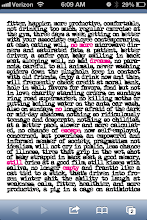Evelina and Lord Orville ride off into the sunset, and they all lived happily every after...
This is how I feel the story really should have ended. I was really confused by the end because I was expecting a completely different ending from the criticism I read for my presentation last week. In Campbell's article, she makes it seem like Lord Orville's declaration of his love is one of friendship, not one of marriage. After I finished Evelina, I was a little shocked and misled because of Campbell's interpretation and presentation of the text. So what do you do when a critical essay misrepresents a text and downplays the contents to fit the argument??? Campbell argues that Orville empowers Evelina, looks at her as a friend, and elevates her to his superior when his trial of mosreading her conduct are over (449-450). But doesn't marriage kind of undo that argument? Does Orville only profess his love becuase of her good conduct and nature, or is it in part to do with her status? Whether her father recognizes her or not, Orville knows the story and knows that she has good relations and good company that suggest her status. And better yet, the marriage is arranged! Evelina is told she is going to be married to Lord Orville. Is this something that really empowers Evelina??? And is it something that only recognizes her virtuous nature? Campbell argues that Orville notices moments, especially in her meeting Macartney and Sir Willoughby, where Evelina's virtue may be questioned, calling him a bad reader becuase he is judging the actions out of context. She says further that these are moments where Evelina cannot explain herself and her silence ends up hurting her (further saying that a woman's silence is the ultimate threat to her reputation, including in publishing). But because Orville realizes this is not true and protects Evelina from the evil forces of Sir Willoughby, he becomes her friend and protector and is redeemed as a good reader (which would parallel the argument I talked about on Thurs that Burney was seeking protection from male critics to see her work as virtuous and not misread moments that are innocent). Campbell never mentions the marriage though...and this is important becuase one can argue that Orville did all of this becuase he really liked Evelina (as is indicated throughout the text from the moment he met her) and wanted to keep her safe for that reason. Her virtue plays a role, but there are other reasons for their match in the end, especially Sir Belmont's intervention. To me it seems that by omitting the fact that they are to get married and only refering to their friendly love for eachother, Campbell is protecting herself from critics that would break down her use or Orville as a reader of Evelina and say taht it may not be as reliable of a reference as it seems if this information is included. If anyone has a chance to read the article (its pretty short) and can help me work this out, that would be awesome!
And one more thing, what is with the monkey at the end??? Can somebody please help me out with this. It seems so out of place and ridiculous, but important becuase of that. Dr. Maruca, I think anyone who can answer that deserves some extra credit!
Tuesday, April 7, 2009
Subscribe to:
Post Comments (Atom)




I have theories.
ReplyDelete1. Monkeys have historically been seen as bad omens. In tassology (tea leaf reading) it is interpreted as a guard against gossip. They are clever and curious and tend to get themselves into trouble (Like Curious George!) So the monkey could be stifling gossip (which appears in the book quite a few times) and we don't see the significance unless we look into it more closely.
2. It parallels the granny race scene in that it stops the soap opera narrative to remind us that we're actually reading a romantic comedy and thereby downplays the drama.
3. Burney was just weird. It was some kind of inside joke from back in the day and it made her laugh so she threw it in. Wouldn't surprise me. The book still sold and most of us still like it, right?
I found a link that may help, but I can't get into the actual text. Maybe it needs to be opened through the Wayne Library database or something. Here it is:
Hamilton, Patricia L.
Monkey Business: Lord Orville and the Limits of Politeness in Frances Burney's Evelina
Eighteenth Century Fiction - Volume 19, Number 4, Summer 2007, pp. 415-440
Thanks! I'll have to check that out!
ReplyDelete